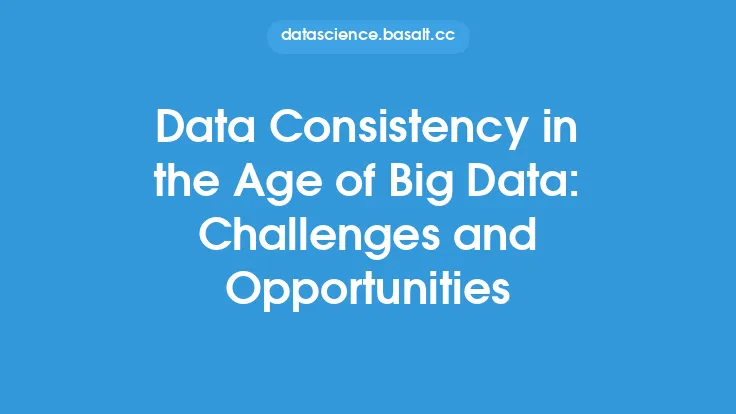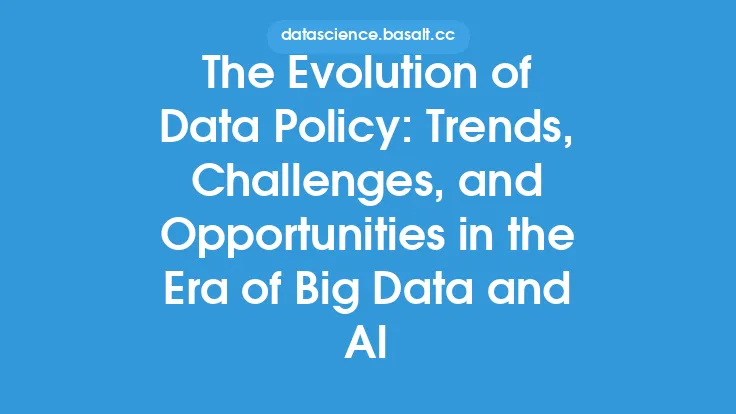The field of big data engineering is a complex and multifaceted one, presenting a wide range of challenges and opportunities for organizations and individuals alike. At its core, big data engineering involves the design, development, and maintenance of systems and architectures that can handle the vast amounts of data being generated by today's digital world. This includes everything from social media posts and sensor readings to transactional data and customer interactions.
Introduction to Big Data Engineering Challenges
One of the primary challenges facing big data engineers is the sheer volume and variety of data that must be processed and analyzed. This data can come in many different forms, including structured, semi-structured, and unstructured formats, and can be generated by a wide range of sources, from social media platforms to IoT devices. To handle this data, big data engineers must design and implement systems that can scale to meet the needs of the organization, while also providing the necessary processing power and storage capacity to handle the data.
Data Ingestion and Processing
Data ingestion and processing are critical components of big data engineering, as they involve the collection, transportation, and processing of large amounts of data. This can be a challenging task, particularly when dealing with high-volume or high-velocity data streams. To address this challenge, big data engineers often use distributed computing frameworks such as Hadoop or Spark, which can handle large amounts of data and provide the necessary processing power to analyze it. Additionally, data ingestion tools such as Flume or Kafka can be used to collect and transport data from various sources, while data processing frameworks such as MapReduce or Flink can be used to analyze and transform the data.
Data Storage and Management
Data storage and management are also critical components of big data engineering, as they involve the storage and management of large amounts of data. This can be a challenging task, particularly when dealing with high-volume or high-variety data sets. To address this challenge, big data engineers often use distributed storage systems such as HDFS or Ceph, which can handle large amounts of data and provide the necessary storage capacity to meet the needs of the organization. Additionally, data management tools such as Hive or Pig can be used to manage and analyze the data, while data governance frameworks such as data lakes or data warehouses can be used to provide a centralized repository for the data.
Security and Governance
Security and governance are also important considerations in big data engineering, as they involve the protection and management of sensitive data. This can be a challenging task, particularly when dealing with high-risk or high-value data sets. To address this challenge, big data engineers often use security frameworks such as encryption or access control, which can protect the data from unauthorized access or tampering. Additionally, governance frameworks such as data classification or data retention can be used to manage and protect the data, while compliance frameworks such as GDPR or HIPAA can be used to ensure that the data is handled in accordance with regulatory requirements.
Opportunities in Big Data Engineering
Despite the challenges, big data engineering also presents a wide range of opportunities for organizations and individuals alike. One of the primary opportunities is the ability to gain insights and make data-driven decisions, which can help organizations to improve their operations, reduce costs, and increase revenue. Additionally, big data engineering can help organizations to improve their customer experience, by providing personalized recommendations and tailored services. Furthermore, big data engineering can help organizations to develop new products and services, by analyzing customer behavior and preferences.
Emerging Trends in Big Data Engineering
There are several emerging trends in big data engineering, including the use of cloud-based services, the adoption of artificial intelligence and machine learning, and the development of edge computing architectures. Cloud-based services such as AWS or Azure can provide big data engineers with the necessary infrastructure and tools to design and implement big data systems, while artificial intelligence and machine learning can be used to analyze and gain insights from the data. Edge computing architectures, on the other hand, can be used to process and analyze data in real-time, by pushing the computation to the edge of the network.
Conclusion
In conclusion, big data engineering is a complex and multifaceted field that presents a wide range of challenges and opportunities for organizations and individuals alike. By understanding the challenges and opportunities of big data engineering, organizations can design and implement systems and architectures that can handle the vast amounts of data being generated by today's digital world. Additionally, by staying up-to-date with the latest trends and technologies, big data engineers can help organizations to gain insights and make data-driven decisions, while also improving the customer experience and developing new products and services.





